A Comprehensive Guide to the Tylenol Autism Lawsuit
- Last Updated: June 12th, 2025

Attorney Jessie Paluch, founder of TruLaw, has over 25 years of experience as a personal injury and mass tort attorney, and previously worked as an international tax attorney at Deloitte. Jessie collaborates with attorneys nationwide — enabling her to share reliable, up-to-date legal information with our readers.
Legally Reviewed
This article has been written and reviewed for legal accuracy and clarity by the team of writers and legal experts at TruLawsuit Info and is as accurate as possible. This content should not be taken as legal advice from an attorney. If you would like to learn more about our owner and experienced injury lawyer, Jessie Paluch, you can do so here.
Fact-Checked
TruLawsuit Info does everything possible to make sure the information in this article is up to date and accurate. If you need specific legal advice about your case, contact our team by using the chat on the bottom of this page. This article should not be taken as advice from an attorney.
Key Takeaways:
- The post covers the Tylenol Autism Lawsuit, spotlighting the legal battle and controversy over Tylenol's alleged link to autism in children.
- It discusses scientific viewpoints and research findings on the Tylenol-autism connection, highlighting complexities in proving causation.
- The article emphasizes implications for public perception, pharmaceutical industry, and healthcare litigation, urging thoughtful consideration of the case's ripple effects.
A Comprehensive Guide to the Tylenol Autism Lawsuit
Are you curious about the ongoing mass tort cases linking Tylenol to autism and the potential risks of acetaminophen exposure?
If you’ve been following the opinion surrounding the autism litigation controversy, you’re not alone.
Many plaintiffs like yourself are seeking a comprehensive guide to understand the details and implications of these mass tort lawsuits.
If you have suffered a personal injury, we offer a free consultation to help you navigate through this complex legal process.
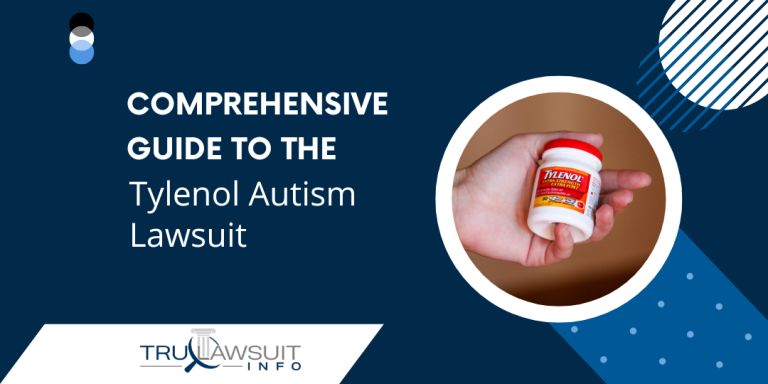
In recent years, there has been a growing concern regarding the potential link between brand acetaminophen products, such as Tylenol, and autism.
Acetaminophen exposure has led to an increase in acetaminophen lawsuits.
This legal battle involves various key players, including plaintiffs, their families, attorneys, and pharmaceutical companies involved in acetaminophen lawsuits and Tylenol lawsuits.
Understanding the history and current status of these court cases is crucial for lawyers and attorneys interested in staying informed about this evolving situation.
A study on these cases will provide valuable insights.
We’ll delve into the settlements reached in acetaminophen autism lawsuits and ADHD cases and discuss class action lawsuits involving plaintiffs, trial attorneys, and both autism and ADHD.
By examining different perspectives and offering insights into this complex issue of acetaminophen exposure, we aim to equip you with a comprehensive understanding of the Tylenol autism lawsuits.
Our attorneys specialize in product liability cases related to acetaminophen use.
Remember that if you need any adjustments or further assistance with your blog post content, don’t hesitate to contact me.
I’m here to help with expert advice and updates on our products.
Table of Contents
Potential Risks of Tylenol and Autism Connection
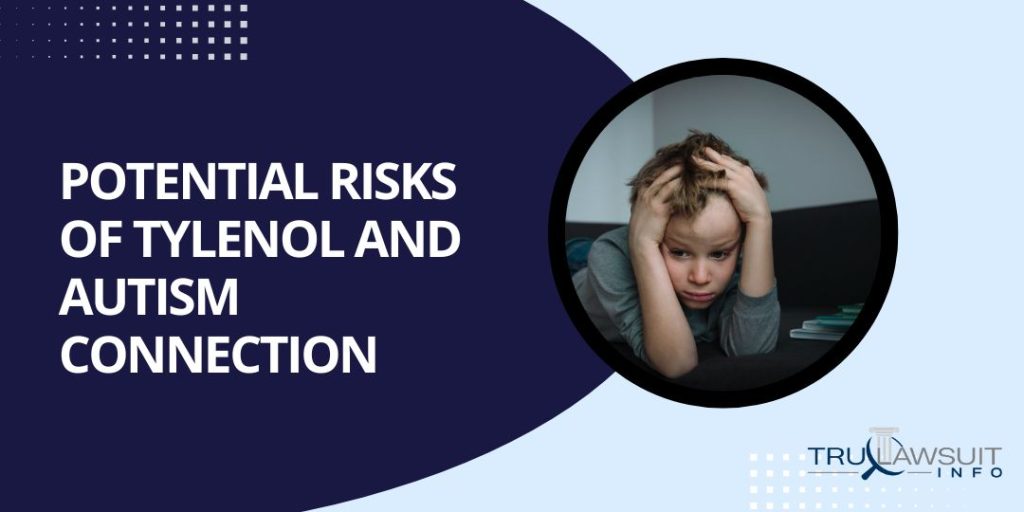
The potential risks of acetaminophen exposure during pregnancy, specifically in pregnant women, have sparked significant debate and concern regarding acetaminophen autism.
This has led to increased scrutiny of product liability.
Scientific studies have suggested a possible link between acetaminophen exposure and an increased risk of autism in children.
This has led to a Tylenol ADHD lawsuit against the drug, specifically targeting pregnant women who used it.
While this study is still under investigation, it is essential to explore the proposed mechanisms behind the causal link between contact and disorders and acknowledge conflicting research findings.
Several scientific studies have indicated that pregnant women who use acetaminophen (the active ingredient in Tylenol) during pregnancy may have an elevated risk of their child developing autism spectrum disorder (ASD).
These studies have observed higher rates of autism spectrum disorder (ASD) among children whose mothers took acetaminophen while pregnant compared to those who did not.
The findings suggest a possible link between acetaminophen use and autism cases.
The findings have raised questions about the potential role Tylenol plays in neurodevelopmental disorders like autism.
Tylenol lawsuits and Tylenol class action lawsuits have highlighted concerns about the impact of this drug on ADHD and other related conditions.
Researchers believe that acetaminophen, such as Tylenol, could influence brain development during pregnancy by affecting hormonal pathways or altering immune responses in the developing fetus.
This has led to an increase in Tylenol autism cases and subsequent Tylenol autism lawsuits, including a potential Tylenol autism class action lawsuit.
Conflicting Research and Regulatory Response
Some propose that exposure to acetaminophen during critical periods of brain development might disrupt normal processes, leading to an increased susceptibility to develop autism spectrum disorder (ASD).
This has led to the emergence of Tylenol autism lawsuits, with individuals seeking justice through the Tylenol autism ADHD lawsuit and participating in a Tylenol autism class action.
However, it is important to note that these proposed mechanisms still require further investigation through study and analysis of exposure and diagnosis in specific cases.
Despite these suggestive findings, it is crucial to recognize the existence of conflicting research on this matter.
This warning is important when studying exposure cases.
Some studies have failed to establish a significant association between prenatal acetaminophen exposure during pregnancy and the risk of autism in a child.
However, it is important to note that there is an ongoing Tylenol class action lawsuit regarding the potential risks associated with prenatal acetaminophen use.
These conflicting results highlight the complexity of studying such associations and emphasize the need for more comprehensive investigations into cases of exposure and warning during pregnancy.
In response to concerns about potential risks associated with acetaminophen, regulatory bodies such as the U.S. Food and Drug Administration (FDA) have issued a warning about child exposure to Tylenol during pregnancy.
Warning labels on pregnancy products containing acetaminophen now caution against its use without medical advice if pregnant or breastfeeding.
This is especially relevant in light of the recent Tylenol class action lawsuit and Tylenol autism lawsuits, which have prompted concerns about the safety of using these products during pregnancy.
Balancing Benefits and Considerations
It is worth noting that while some studies suggest a possible link between acetaminophen use during pregnancy and an increased risk of autism in the child, this should not overshadow the benefits of acetaminophen as a pain reliever when used appropriately.
However, it is important to be aware of this potential warning and consider it if you have a child diagnosed with ADHD.
Tylenol, containing acetaminophen, has been widely used and considered safe for decades, providing relief from various ailments.
However, recent court cases have raised concerns about the lack of warning labels on the product.
Updates on Settlements in 2023

In 2023, there have been significant updates regarding settlements related to the plaintiffs in Tylenol and autism cases.
The court has made progress in resolving these lawsuits concerning acetaminophen use.
These updates provide valuable information about the compensation awarded to plaintiffs in the Tylenol autism lawsuits, as well as notable motions to dismiss class action cases and developments surrounding these settlements.
Judge Cote’s involvement in these cases is also highlighted.
Potential Settlement Amounts and Class Action Progress
One of the most crucial aspects of these updates is the potential settlement amounts for class action cases and their plaintiffs in the multidistrict litigation (MDL) process.
Plaintiffs who have filed cases against Tylenol for alleged links between acetaminophen use and autism spectrum disorder eagerly await news of settlement values.
Families affected by ADHD are also involved in these lawsuits.
The latest information indicates that several plaintiffs in the class action cases have indeed reached a settlement stage, offering hope for those seeking justice.
Judge Cote is overseeing the multidistrict litigation (MDL).
The year 2023 has seen a surge in new studies examining the relationship between acetaminophen use during pregnancy and ADHD risk in children.
These studies are related to ongoing cases and potential Tylenol lawsuits.
These studies have contributed to an increased awareness of potential connections between the various autism spectrum disorders and pregnancy, prompting more plaintiffs to come forward with their cases.
As a result, legal proceedings involving plaintiffs have gained momentum, leading to progress in settling some cases.
The judge’s involvement in the MDL, specifically Judge Cote, has been instrumental in this progress.
Recent developments indicate that birth cohorts from specific years, including pregnancy cases, are receiving particular attention within these settlements.
The plaintiffs in these cases, referred to as cote, are involved in the ongoing legal proceedings.
Researchers are focusing on understanding how exposure to acetaminophen during pregnancy may impact ADHD risk in cases of autism.
By pinpointing exact timeframes when exposure to certain substances is most influential during pregnancy, experts hope to strengthen legal arguments for plaintiffs in lawsuits.
This information can shed light on causation factors and be used as evidence before a judge.
Varied Outcomes and Notable Cases
It is important to note that while settlements are being reached, each case brought forward by the plaintiffs in the lawsuit presents unique circumstances that can influence outcomes.
The judge overseeing the multidistrict litigation (MDL) will consider these factors when making decisions.
Some plaintiffs may receive substantial compensation due to strong evidence linking their child’s condition directly to acetaminophen use in pregnancy.
Others may face challenges in proving causation or establishing a clear timeline of exposure in a lawsuit involving pregnancy, ADHD, and an MDL.
Legal Options for Individuals Involved in the Lawsuits
If you or a loved one has been affected by alleged acetaminophen-related injuries or conditions, it is important to understand the legal avenues available to seek justice, including filing a Tylenol autism lawsuit and participating in multidistrict litigation (MDL) under the supervision of a judge.
There are several options for pursuing legal action, including class action lawsuits, multidistrict litigation (MDL), individual claims, and filing a case with a judge for autism, ADHD, or acetaminophen-related issues.
Class action lawsuits
One of the most common ways individuals join ongoing litigation against Tylenol manufacturers is through Tylenol ADHD class action lawsuit.
These lawsuits are often part of multidistrict litigation (MDL), where a judge oversees multiple cases involving claims related to acetaminophen.
Some individuals may be filing lawsuits due to concerns about a potential link between acetaminophen and autism.
These lawsuits involve a group of people who have suffered similar harm due to a shared cause – in this case, alleged injuries or conditions caused by acetaminophen, which is the active ingredient in Tylenol.
The lawsuits have been consolidated into multidistrict litigation (MDL) and will be overseen by a judge.
One of the alleged conditions being examined in this litigation is autism.
By joining forces with other affected individuals in a lawsuit, plaintiffs can pool their resources and strengthen their legal battle against acetaminophen.
This approach is especially effective when the lawsuit is part of multidistrict litigation (MDL), and a judge oversees the case.
In a class action lawsuit, one or more representative plaintiffs file a lawsuit on behalf of all members of the class who have experienced similar harm.
This allows the judge to efficiently handle multiple cases involving acetaminophen and ADHD through the use of multidistrict litigation (MDL).
This approach allows for efficiency in legal proceedings as it consolidates multiple claims into one lawsuit.
It ensures that a judge can handle the case more effectively by organizing it as a multidistrict litigation (MDL).
Additionally, this process is particularly relevant in cases related to autism.
If successful, compensation awarded by a judge in a Tylenol class action lawsuit is typically distributed among all eligible members of the class, including those affected by autism.
Multidistrict litigation (MDL)
Multidistrict litigation (MDL) is another option available for those seeking legal recourse against Tylenol manufacturers.
MDL cases involving lawsuits related to autism and ADHD are consolidated into one federal court for pretrial proceedings under the supervision of a judge.
This allows for efficient management of complex cases involving numerous plaintiffs across different jurisdictions, such as lawsuits related to autism and the use of acetaminophen, with a judge overseeing the proceedings.
Unlike class actions, where plaintiffs are considered as a single group, MDL cases, such as those involving a lawsuit, are handled by a judge and maintain individual identities.
This is especially important in cases related to autism and ADHD.
Each plaintiff in the Tylenol autism lawsuit retains their own attorney and presents evidence specific to their claim while benefiting from shared discovery and pretrial procedures involving the judge.
The lawsuit revolves around the alleged connection between autism and acetaminophen.
Individual claims
Individual claims provide an alternative option for pursuing justice if you prefer not to join a class action lawsuit or MDL case.
By filing an individual acetaminophen lawsuit, you can focus on your unique circumstances and seek compensation tailored to your specific injuries or conditions allegedly caused by Tylenol, such as autism or ADHD.
To pursue an individual lawsuit claim related to acetaminophen and its potential connection to Tylenol, autism, or ADHD, it is crucial to consult with experienced Tylenol autism lawyers who specialize in pharmaceutical litigation.
These legal experts can guide you through the lawsuit process involving autism, assess the strength of your case related to acetaminophen, and help build a solid legal strategy.
Eligibility criteria and requirements
While legal representation is vital for pursuing any autism or acetaminophen-related lawsuits, it is important to note that eligibility criteria may vary depending on the type of lawsuit.
Implications of Tylenol Usage While Pregnant
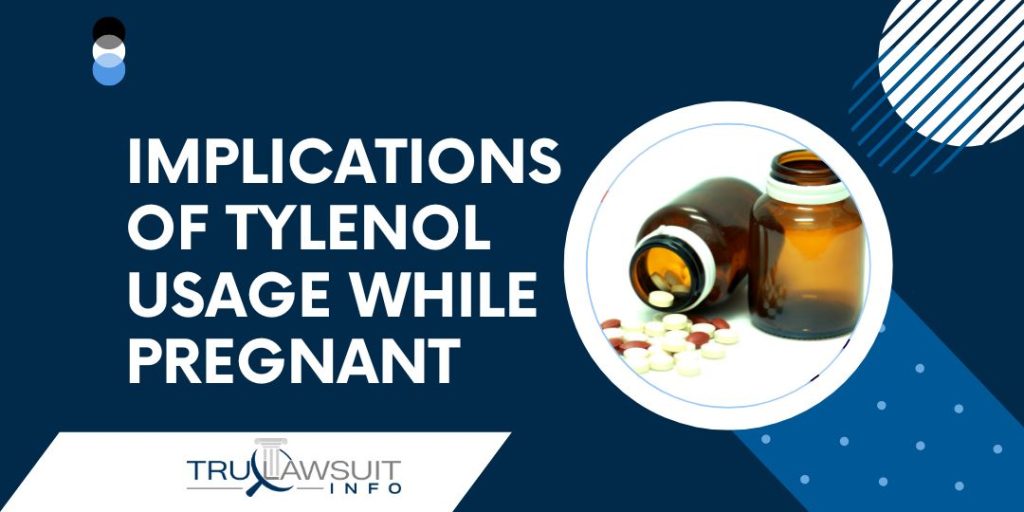
Using acetaminophen, commonly known as Tylenol, during pregnancy is a common practice among expectant mothers, but recent concerns have been raised about its potential risks.
There have been lawsuits for tylenol during pregnancy.
Pregnant women often turn to acetaminophen, commonly known as Tylenol, for relief from various discomforts such as headaches, backaches, or fever.
However, recent concerns have arisen regarding a potential link between acetaminophen use during pregnancy and an increased risk of autism.
This has led to a lawsuit against the makers of Tylenol.
Studies Suggesting a Link and Lawsuit Implications
However, studies have suggested a potential link between prenatal acetaminophen exposure (the active ingredient in Tylenol) and adverse effects on the developing fetus, including a potential risk for autism.
This has led to a lawsuit being filed against the manufacturers of Tylenol.
Researchers have highlighted concerns about the impact of Tylenol usage during pregnancy on fetal brain development and the subsequent risk of autism.
This has led to a lawsuit.
Several studies have found associations between frequent use of acetaminophen, also known as Tylenol, during pregnancy and an increased likelihood of certain birth defects.
There have been lawsuits filed claiming a link between acetaminophen use during pregnancy and the development of autism in children.
Study Findings and Lawsuit Implications
For example, one study published in JAMA Pediatrics reported that children exposed to Tylenol during pregnancy had a higher risk of developing attention deficit/hyperactivity disorder (ADHD) symptoms by age seven.
This finding has led to a lawsuit involving Tylenol and autism.
Another study published in JAMA Psychiatry found an association between prenatal exposure to acetaminophen, also known as Tylenol, and an increased risk of behavioral problems in children.
This study adds to the growing concern surrounding the Tylenol autism lawsuit.
While these studies do not establish causation, they raise important questions about the potential risks associated with acetaminophen usage during pregnancy.
This is particularly relevant in light of the recent lawsuit linking acetaminophen to autism.
It is crucial for expectant mothers to consult their healthcare professionals before taking any acetaminophen medication, such as Tylenol, while pregnant to avoid any potential risks of autism and the possibility of being involved in a lawsuit.
Healthcare providers can provide personalized guidance based on individual circumstances and help weigh the potential benefits of acetaminophen against the possible risks of a lawsuit regarding Tylenol and autism.
In addition to consulting healthcare professionals, it is essential for pregnant women to be aware of alternative approaches for managing pain or discomfort without relying solely on acetaminophen or Tylenol.
This is especially important in light of the recent lawsuit concerning Tylenol and autism.
Non-pharmacological interventions such as physical therapy, relaxation techniques, or gentle exercises may offer relief without exposing the fetus to potentially harmful substances like acetaminophen.
This is particularly relevant in the context of concerns over the Tylenol autism lawsuit.
Balancing Expert Opinions and Caution
It’s worth noting that not all experts agree on the extent of the risks associated with acetaminophen usage during pregnancy, including the potential link to autism.
Additionally, there may be ongoing lawsuits related to this issue.
Some argue that the existing evidence in the lawsuit involving acetaminophen and Tylenol autism is inconclusive, and more research is needed to establish a clear causal relationship.
However, given the potential implications on fetal development and neurodevelopmental disorders such as autism, expectant mothers should exercise caution when using acetaminophen, also known as Tylenol or any other medication during pregnancy.
It’s important to be aware of the ongoing lawsuit surrounding the use of acetaminophen during pregnancy.
Connection Between Tylenol and Injury
In recent years, there have been growing concerns about the potential connection between the popular pain reliever acetaminophen (Tylenol) and various injuries, including a potential lawsuit and its alleged link to autism.
While acetaminophen (Tylenol) is widely used and considered safe when taken as directed, some individuals claim that its use has resulted in adverse health effects unrelated to autism.
This has led to a lawsuit.
One of the most commonly reported injuries associated with acetaminophen, also known as Tylenol, is liver damage.
Acetaminophen has been linked to potential risks for autism.
Numerous cases have emerged where individuals allege that their consumption of acetaminophen, specifically Tylenol, led to severe harm to their liver and potential links to autism.
Excessive acetaminophen consumption, the active ingredient in Tylenol, has been cited as a possible cause of liver failure in individuals with autism.
Correlation Between Acetaminophen Use, Liver Damage, and Autism Concerns
The correlation between acetaminophen use, specifically Tylenol, and liver damage is not without merit.
Additionally, there has been speculation about a potential link between acetaminophen use and autism.
In fact, there have been several high-profile cases where individuals experienced significant injury due to their use of acetaminophen, specifically Tylenol, in relation to autism.
For instance, a well-publicized lawsuit involved a woman who suffered from acute liver failure after taking excessive amounts of acetaminophen (Tylenol) over an extended period.
This case raised concerns about the potential link between acetaminophen and autism.
Her case shed light on the potential dangers associated with improper use or overdose of acetaminophen, commonly known as Tylenol, and its possible connection to autism.
Beyond Liver Damage: Expanding Allegations
Liver damage and autism are not the only injuries that have been linked to Tylenol usage.
Other reports suggest a potential connection between acetaminophen, also known as Tylenol, and kidney problems, gastrointestinal issues, and even cardiovascular complications in relation to autism.
While further investigation and scientific evidence are needed for conclusive proof, this Tylenol autism claims about the safety profile of acetaminophen, also known as Tylenol, and its potential link to autism raises important questions.
It is crucial to note that while these allegations exist, they do not necessarily imply causation or establish a direct link between acetaminophen (Tylenol) and injuries, including autism.
The complexity of human physiology makes it challenging to pinpoint one specific factor responsible for adverse health effects experienced by individuals who have consumed acetaminophen, such as Tylenol, and its potential link to autism.
However, it is essential for consumers to be aware of such reported cases and exercise caution when using any medication, including acetaminophen, especially in relation to autism.
It is always advisable to follow recommended dosage guidelines for acetaminophen, such as Tylenol, and consult a healthcare professional if any concerns about autism arise.
Concerns Regarding Children Taking Tylenol or Generic Acetaminophen
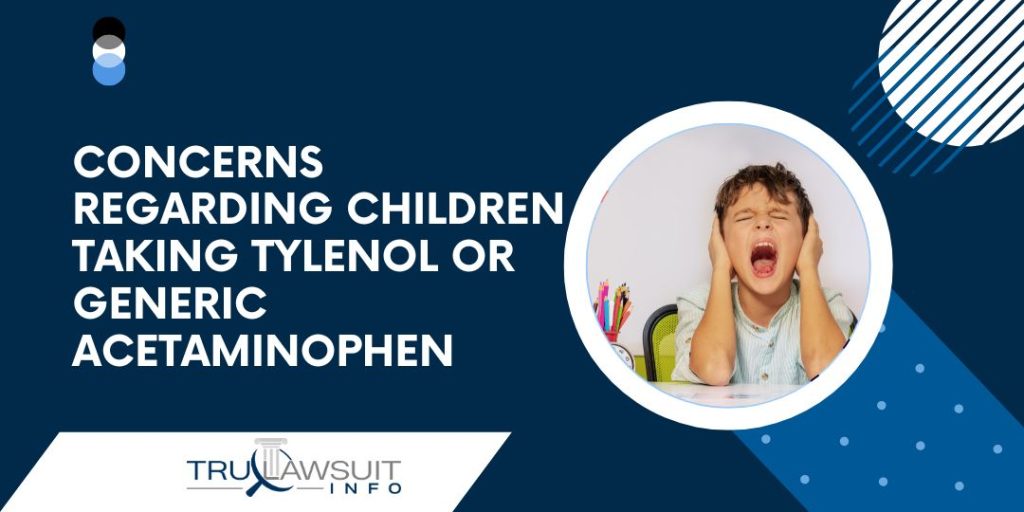
Administering acetaminophen, commonly known as Tylenol, to children is a common practice to alleviate their pain and discomfort without any connection to autism.
However, there are certain concerns that need to be addressed.
This comprehensive guide aims to shed light on the potential risks associated with administering acetaminophen, commonly known as Tylenol, to children and emphasizes the importance of following healthcare professionals’ advice regarding Tylenol autism.
One of the primary concerns revolves around safety.
While Tylenol and generic acetaminophen products are widely available over-the-counter, it is essential for parents and caregivers of children with autism to understand the dosage guidelines and potential side effects before administering them.
Children have unique physiological characteristics that may affect how they metabolize drugs, including Tylenol and acetaminophen, making it crucial to ensure appropriate dosing.
Exploring Acetaminophen Exposure and Autism
Acetaminophen exposure, including prenatal exposure, has been a subject of research interest regarding Tylenol and autism.
Some studies suggest a possible link between acetaminophen use during pregnancy and an increased risk of attention deficit hyperactivity disorder (ADHD) or autism spectrum disorder (ASD) in offspring.
While further research is needed for definitive conclusions, parents should consider discussing any concerns about Tylenol and autism with their healthcare provider.
It is important to have a conversation about the potential effects of acetaminophen on autism.
Both brand acetaminophens products like Tylenol and generic acetaminophen alternatives contain the same active ingredient: acetaminophen.
However, differences can exist in inactive ingredients, such as flavorings or dyes, that might affect individual sensitivities or allergies to acetaminophen, including Tylenol.
Understanding Possible Interactions and Contradictions
Additionally, some studies have explored a potential link between the use of acetaminophen during pregnancy and an increased risk of autism.
It’s important for parents to read labels carefully and consult healthcare professionals if their child has any known allergies or sensitivities, including Tylenol autism, and acetaminophen.
One must remember that not all pain relievers, such as acetaminophen (Tylenol), are suitable for every situation, including autism.
Certain drugs, such as Tylenol (acetaminophen), may interact with each other or have contraindications depending on the child’s medical history or current conditions, including autism.
Therefore, seeking professional advice from pediatricians or pharmacists becomes paramount before giving any medicine, including Tylenol.
It is important to consult with a healthcare professional regarding the use of acetaminophen in relation to autism.
In addition to safety concerns, parents should also be aware of potential side effects that may arise from Tylenol use in children with autism.
While generally considered safe when used as directed, some children may experience adverse reactions such as skin rashes or liver problems when taking acetaminophen, also known as Tylenol.
It is important to be aware of these potential risks.
Monitoring for any unusual symptoms related to acetaminophen, such as Tylenol, and seeking immediate medical attention if they occur is crucial for autism.
To ensure the safe administration of Tylenol or generic acetaminophen to children with autism, it is essential to follow healthcare professionals’ advice.
Increase in the Number of Tylenol Lawsuits
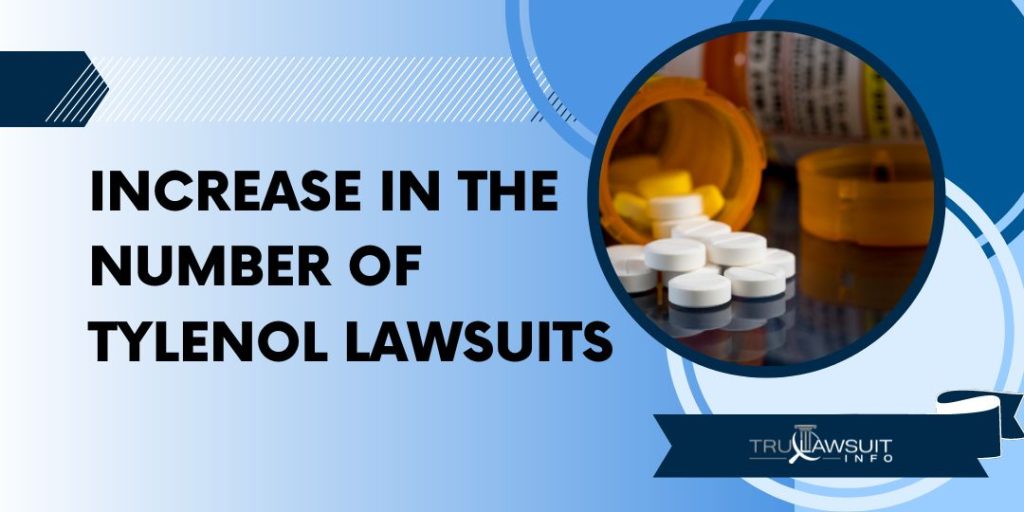
The number of lawsuits filed against the manufacturers of Tylenol, a popular brand of acetaminophen, has been steadily increasing over time, reflecting a growing concern among consumers about its potential link to autism.
These legal actions are related to alleged injuries or conditions caused by acetaminophen, specifically Tylenol, and its potential connection to autism.
Statistics and figures further highlight this rise in Tylenol litigation related to acetaminophen, specifically Tylenol, and its potential connection to autism.
These numbers paint a clear picture of the escalating issue.
Increased Awareness and Potential Risks
One possible reason behind the surge in Tylenol lawsuits is the increased awareness among individuals regarding potential risks associated with acetaminophen, especially in relation to autism, the active ingredient in Tylenol.
As more people become informed about the dangers associated with acetaminophen, specifically Tylenol, they are more likely to take legal action if they believe they have suffered harm, such as autism, as a result of using it.
Product liability claims involving acetaminophen have a significant impact on the increasing number of lawsuits against Tylenol manufacturers, especially in relation to autism.
When a product like Tylenol, which contains acetaminophen, is deemed dangerous or defective, those who have experienced adverse effects, such as autism, may seek compensation through legal means.
The responsibility lies with acetaminophen drug manufacturers like Tylenol to ensure their products, including those used for autism, are safe for consumption and properly warn users about any potential risks.
Class-Action Lawsuits and Collective Claims
Furthermore, class-action lawsuits have become increasingly common in cases involving acetaminophen, particularly in relation to autism.
These lawsuits allow multiple individuals who have suffered similar injuries or damages from using acetaminophen, such as Tylenol, to join forces and file a collective claim against the manufacturer(s) for autism.
By consolidating these acetaminophen and autism cases into one lawsuit, plaintiffs can pool their resources and increase their chances of obtaining a favorable outcome.
Role of Expert Attorneys in the Surge
The involvement of attorneys specializing in dangerous drug lawsuits, such as those related to acetaminophen, has also contributed to the rise in Tylenol litigation, including cases involving autism.
These lawyers possess expertise in navigating complex legal processes and advocating for individuals who believe they have been harmed by medications like Tylenol, including acetaminophen.
They also provide assistance to those who suspect a link between certain medications and autism.
Their representation empowers victims to pursue justice and hold pharmaceutical companies accountable for any negligence or wrongdoing involving acetaminophens, such as Tylenol, and its potential connection to autism.
Moreover, using acetaminophen, commonly known as Tylenol, may contribute to an increased risk associated with autism.
For instance, studies have suggested that pregnant women who use acetaminophen during pregnancy may have a higher likelihood of giving birth to children with autism and certain other health conditions.
This finding has led to an uptick in lawsuits filed against Tylenol manufacturers by parents seeking compensation for their child’s medical expenses and related damages caused by acetaminophen and its potential link to autism.
Role of Medical Records in Tylenol Lawsuits
Medical records play a crucial role in acetaminophen-related lawsuits, especially those involving autism.
They serve as vital pieces of evidence that can make or break a case.
These records provide a comprehensive account of an individual’s medical history, documenting symptoms, diagnoses, treatments, and other relevant information necessary for legal proceedings related to autism and the use of acetaminophen.
Medical records are invaluable.
They help connect the dots between the use of acetaminophen (Tylenol) and the resulting harm or injury suffered by individuals with autism.
By thoroughly documenting symptoms experienced by the patient before and after taking acetaminophen (Tylenol), medical records can demonstrate a clear link between the medication and any adverse effects, including potential connections to autism.
During litigation, medical records related to autism are used as evidence to support claims made by plaintiffs regarding the potential link between acetaminophen and autism.
Attorneys specializing in autism rely on these documents to build their case and prove negligence or wrongdoing on the part of Johnson & Johnson, the manufacturer of Tylenol.
The more detailed and comprehensive the medical records are for individuals with autism, the stronger the argument becomes.
Let’s delve into why medical records hold such significance in Tylenol lawsuits, especially those involving autism:
1. Establishing Causation: Medical records provide a timeline that shows when an individual with autism started using Tylenol and when adverse symptoms related to autism began to appear.
This helps establish a causal relationship between the medication and any harm suffered, especially in individuals with autism.
2. Documenting Autism Symptoms: Detailed descriptions of autism symptoms recorded in medical records serve as concrete evidence linking Tylenol usage to specific health issues experienced by individuals with autism.
These symptom reports can include anything from liver problems to allergic reactions in individuals with autism.
3. Diagnoses and Treatments: Medical records outline autism diagnoses made by healthcare professionals based on their assessments of patients’ conditions.
They document treatments prescribed for managing symptoms associated with Tylenol usage in individuals with autism.
Both autism diagnoses and treatments help substantiate claims against Johnson & Johnson.
4. Relevant Information: Apart from capturing symptoms, diagnoses, and treatments related specifically to Tylenol usage, medical records may also contain other pertinent information about autism.
This could include pre-existing conditions, past medical history, and any medications taken concurrently with Tylenol, especially for individuals with autism.
Such information aids in building a comprehensive case.
In Tylenol lawsuits, medical records related to autism are more than just pieces of paper; they are powerful tools that can make a significant impact on the outcome of a case.
MDL Arguments and Oral Arguments for Class Action
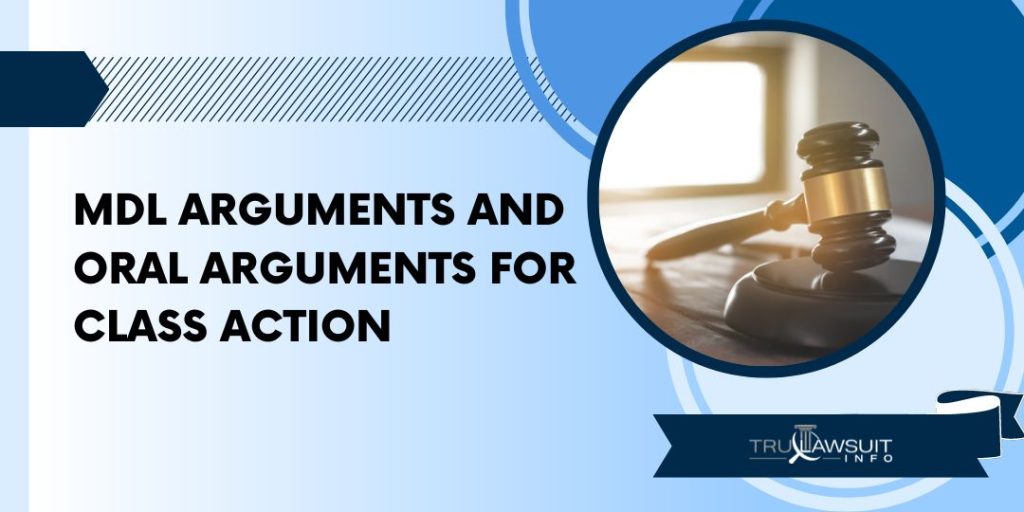
During the multidistrict litigation (MDL) proceedings involving Tylenol lawsuits, various key arguments were presented by both plaintiffs and defendants, including those related to autism.
These arguments revolved around class action certification and the commonality among claims, particularly in cases related to autism.
Let’s delve into the details of these oral arguments related to autism and explore notable court decisions related to these discussions.
One crucial aspect of the MDL involving autism was the oral arguments made by both parties regarding class action certification.
The plaintiffs argued that their claims related to autism shared common issues, making a class action lawsuit appropriate.
They emphasized the similarities in injuries suffered due to alleged defects in Tylenol products, such as liver damage or failure, that could potentially affect individuals with autism.
By presenting evidence of widespread harm caused by Tylenol, they aimed to establish the commonality required for a successful class action related to autism.
Defendants’ Counterarguments and Challenges
Defendants, on the other hand, sought to challenge this notion of commonality among claims related to autism.
They argued that individual circumstances differed significantly, making it inappropriate to certify a class action for autism.
Their rebuttal expert testimony highlighted factors such as varying dosages taken by individuals or pre-existing medical conditions that could contribute to liver damage independently of Tylenol consumption, including individuals with autism.
These arguments aimed to undermine the idea that all plaintiffs’ claims related to autism shared enough similarities for a Tylenol class action lawsuit.
Impactful Court Decisions
Throughout these proceedings, several notable court decisions emerged concerning these arguments.
One significant decision involved Daubert’s motions regarding expert testimony.
The MDL judge had to evaluate whether expert witnesses met the necessary standards for the admissibility of their opinions.
This process played a vital role in determining which experts’ testimonies would be considered valid during the trial.
Master complaints were filed as part of the MDL process.
These comprehensive documents outlined key allegations against defendants and provided a consolidated view of all plaintiffs’ claims within the MDL class action.
The master complaint served as a foundation for further legal proceedings and helped streamline the litigation process.
As part of MDL proceedings, bellwether trials were conducted.
These trials involved selecting a small number of representative cases to be tried before the others.
The outcomes of these bellwether trials provided insights into the strengths and weaknesses of both sides’ arguments, potentially influencing settlement negotiations or future litigation strategies.
Finally, appeals played a crucial role in shaping the Tylenol lawsuit landscape.
Parties dissatisfied with court decisions had the opportunity to challenge them through the appeal process.
These appeals often addressed fundamental legal issues surrounding class action certification and the validity of expert testimony.
Conclusion: Comprehensive Guide to the Tylenol Lawsuit
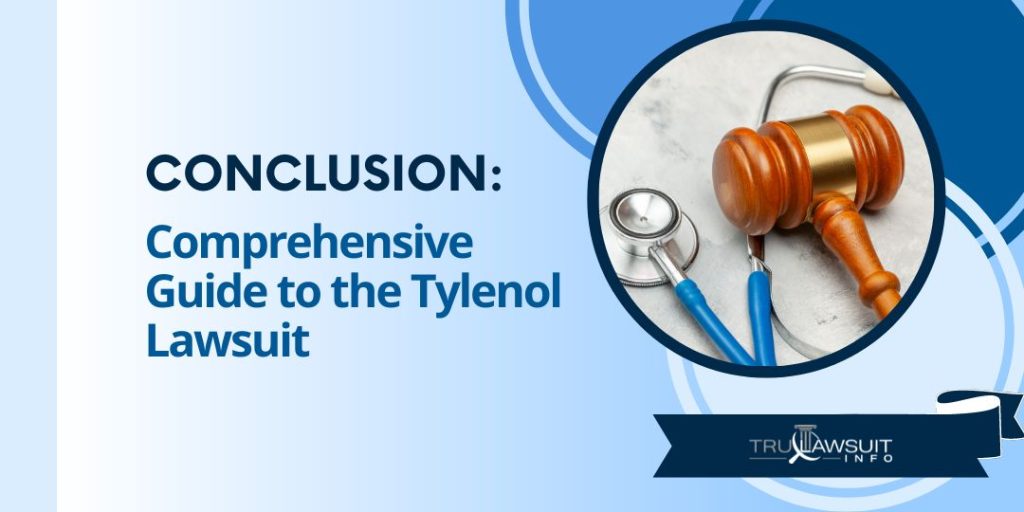
In conclusion, it is crucial for individuals involved in the Tylenol lawsuit to understand their legal options and potential risks associated with this medication.
The connection between Tylenol usage and various health concerns, such as autism, injury, and complications during pregnancy, has raised significant concerns among consumers.
The increase in the number of lawsuits filed against Tylenol indicates a growing awareness of these issues.
If you or someone you know has been affected by Tylenol and believes they may have a case, it is important to consult with a qualified attorney who specializes in pharmaceutical litigation.
They can provide guidance on potential settlements, the role of medical records in building a strong case, and whether joining a Tylenol class-action lawsuit or pursuing an individual claim through multidistrict litigation (MDL) is the best course of action.
Remember that this guide serves as an informative resource but does not replace professional legal advice.
Stay informed about updates on settlements and ongoing developments related to the Tylenol lawsuit.
Your health and well-being matter, so take proactive steps to protect your rights if you believe you have been harmed by this medication.
Frequently Asked Questions
-
Can I Still Use Tylenol While Pregnant?
It is always advisable to consult with your healthcare provider before taking any medication during pregnancy.
While acetaminophen (the active ingredient in Tylenol) is generally considered safe when used as directed during pregnancy, it’s essential to discuss any potential risks or concerns with your doctor.
-
Is There A Link Between Tylenol Use And Autism?
The connection between Tylenol use and autism remains controversial and inconclusive.
Some studies suggest a possible association, but more research is needed to establish a definitive link.
If you have concerns about this topic, consult with medical professionals who can provide personalized advice based on your specific situation.
-
What Are The Potential Risks Of Giving Tylenol To Children?
When used correctly and in appropriate doses, Tylenol is generally safe for children.
However, it is crucial to follow the recommended dosage instructions and consult with a pediatrician if you have any concerns about your child’s health or the use of this medication.
-
How Can I Join A Class-Action Lawsuit Against Tylenol?
To join a class-action lawsuit against Tylenol, you typically need to meet specific criteria set by the legal team handling the case.
It is advisable to consult with an attorney specializing in pharmaceutical litigation who can guide you through the process and determine whether joining a class action or pursuing an individual claim is more appropriate for your circumstances.
-
What Should I Do If I Believe I Have Been Harmed By Tylenol?
If you believe you have been harmed by Tylenol, seek medical attention immediately, and then consult with an experienced attorney specializing in pharmaceutical litigation.
They can evaluate your case, gather necessary evidence, and guide you through the legal process to protect your rights and pursue compensation if applicable.

Experienced Attorney & Legal SaaS CEO
With over 25 years of legal experience, Jessie is an Illinois lawyer, a CPA, and a mother of three. She spent the first decade of her career working as an international tax attorney at Deloitte.
In 2009, Jessie co-founded her own law firm with her husband – which has scaled to over 30 employees since its conception.
In 2016, Jessie founded TruLaw, which allows her to collaborate with attorneys and legal experts across the United States on a daily basis. This hypervaluable network of experts is what enables her to share reliable legal information with her readers!
Have A Case?
Here, at Tru Lawsuit Info, we’re committed to helping victims get the justice they deserve.
To do this, we actively work to connect them with attorneys who are experts in litigating cases similar to theirs.
Would you like our help?
Tru Lawsuit Info is a reliable source of information about issues that may affect your health and safety, such as faulty products, data breaches, and environmental hazards.
Our team of experienced writers collaborates with medical professionals, lawyers, and advocates to produce informative articles, guides, and other resources that raise awareness of these topics.
Our thorough research provides consumers with access to reliable information and updates on lawsuits happening around the country. We also can connect consumers with attorneys if they need assistance.
Camp Lejeune's water contamination issue spanned several decades starting in the 1950s. Exposure to these chemicals has been linked to various serious health issues, including cancer, organ diseases, and death.
Research is increasingly suggesting a link between the use of Tylenol during pregnancy and the development of neurodevelopmental disorders, such as autism and ADHD, in infants.
Legal action is being taken against manufacturers of Aqueous Film-Forming Foam (AFFF), a chemical used in fighting fires. The plaintiffs allege that exposure to the foam caused health issues such as cancer, organ damage, and birth and fertility issues.
Have A Case?
Here, at Tru Lawsuit Info, we’re committed to helping victims get the justice they deserve.
To do this, we actively work to connect them with attorneys who are experts in litigating cases similar to theirs.
Would you like our help?







